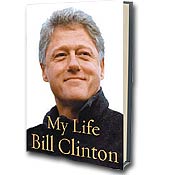
“Bob Gottlieb has compared it to Gabriel García Márquez,” says a friend of Bill Clinton’s about My Life, the former president’s upcoming autobiography. “It’s mythical and mystical, rich and textured. It will be unlike any presidential memoir before it.” Whether the account of Clinton’s post-Lewinsky Oval Office hours will be as compelling as One Hundred Years of Solitude is unclear. But as the utterance of editor Gottlieb’s name as an expert on the book’s contents makes clear, Clinton certainly wasn’t alone while writing the Knopf book, which will be released June 22 with a first run of 1.5 million copies. Among those reported to have read excerpts and made suggestions: Clinton’s Georgetown roommate Tommy Caplan; former aide Ira Magaziner; former deputy secretary of State Strobe Talbott; and, of course, Hillary and Chelsea. Clinton apparently actually wrote the text, an aberration in the age of the ghostwriter, but he didn’t do it without help—from three collaborators in particular.
Clinton anticipated work on an epic autobiography from the moment he was elected in 1992: One of his first calls as president-elect was to Taylor Branch, Pulitzer Prize–winning historian (for Parting the Waters, the first of his planned three-volume biography of Martin Luther King Jr.). The pair became friends on George McGovern’s presidential campaign. Twenty years later, they reconnected, and throughout Clinton’s terms, Branch interviewed him regularly about his time in the White House. Those transcripts became the chief resource for the book’s reconstruction of his presidency.
After leaving office, Clinton turned to his onetime speechwriter Ted Widmer, who now heads the American Studies program at Washington College. As a graduate student at Harvard, Widmer was in a band called the Upper Crust, which won a devout following in Boston and New York by dressing like eighteenth-century aristocrats and playing heavy metal. In his interviews, the focus was on Clinton’s pre-presidency years, including his Boy From Hope childhood. (Several people familiar with the book say it devotes as much attention to Clinton’s early life as to his presidency.)
Legendary ex–New Yorker editor Robert Gottlieb was tapped to steer the project to the end. The men did not have a prior relationship, but Clinton had been impressed by Gottlieb’s work on Katharine Graham’s memoir. In an early exchange, Clinton told the editor he was excited to have him working for him, to which Gottlieb joked, “You don’t understand—you’re working for me.” From the beginning he opted to call him Bill, not Mr. President, sources say, and early on Gottlieb complained to colleagues that his charge was like a bright high-school student who didn’t want to do his homework. But the two grew close. Gottlieb would take his pajamas up to the Clintons’ in Chappaqua, while Clinton worked all night, sometimes in the barn, which was also a gym. (The ability to go back and forth between writing and exercise may help explain why Clinton is newly fit.) Another recent guest spoke of waking early to find Clinton up and about. The guest assumed he had already risen for the day. In fact, the fledgling writer hadn’t even gone to bed.